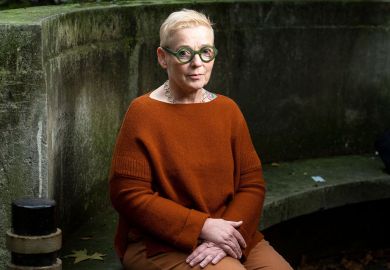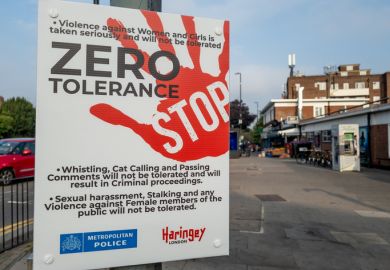The Jo Phoenix case exposed a “shocking failure of leadership in the sector”, according to an academic leading a government-ordered review of the use of sex and gender questions in research, prompting a vice-chancellor to agree the case was “an astounding indictment of British higher education”.
Alice Sullivan, professor of sociology at UCL and head of research at its Social Research Institute, and Adam Habib, director of SOAS University of London, were speaking at a Higher Education Policy Institute (Hepi) event on how university governors and managers can support free speech, where the University of Reading’s vice-chancellor also described the University and College Union as “an example of an echo chamber in higher education”.
One key point of discussion was the case of Professor Phoenix, whom an employment tribunal recently ruled had faced a “hostile environment” at the Open University and discrimination and harassment from colleagues because of her belief that people cannot change their biological sex. She left her post as a professor of criminology at the OU in December 2021 to join Reading.
Professor Sullivan, who is leading a review of the use of sex and gender questions in scientific research and statistics, said the case illustrated that the OU had shown a “profound misunderstanding of what academic freedom is and what it’s for. Harassment and bullying are not protected speech, and attempts to silence others through public shaming and smears have nothing to do with furthering research and education – quite the opposite.
“I would ask, where were the much-vaunted values of equality, diversity and inclusion in the OU’s treatment of Professor Phoenix?
“It’s unconscionable that individuals have to take the burden of going to court because universities will not put their houses in order.
“I’d suggest it demonstrates a shocking failure of leadership in the sector. I think the Phoenix verdict illustrates the fact that university managers have not understood the role of harassment and bullying in undermining academic freedom and generating a climate of fear.”
Highlighting an article defending universities on free speech by Shitij Kapur, the King’s College London vice-chancellor and chair of Universities UK’s free speech and academic freedom advisory group, Professor Sullivan said a “failure to recognise systematic institutional failings across the sector drips with complacency”.
Professor Habib told the event: “I think we’ve been lying to ourselves for a long while that we don’t have a problem.”
There was in UK higher education “a problem where people are scared to talk about substantive issues around identity, trans, race and some political issues like Israel-Palestine, Russia-Ukraine”, he added.
He continued: “I think Alice is right about the Jo Phoenix case. I think it’s an astounding indictment of British higher education. And it’s an indictment of academics…how intolerant some of them can be; it’s an indictment of unions; and, frankly, it’s an indictment of the failure of vice-chancellors to intervene in the way we should have.”
But that was “not to say politicians are right”, Professor Habib went on.
Like other vice-chancellors, he said, he received “multiple letters” on free speech from ministers, and “in the next letter they say, ‘Could you act against a group of student leaders that we don’t like for these particular reasons.’ That’s just unacceptable, schizophrenic behaviour. I think we need to be able to have the courage to call it out.”
Robert Van de Noort, the Reading vice-chancellor, referred to “formal structures” in research and higher education that had “limited the diversity of views” in universities, including the Research Excellence Framework.
For example, “the economics and econometrics panel in particular is renowned for valuing traditional outputs that adhere to the paradigm of neoclassical economics to the exclusion of other theoretical approaches, such as feminist or development economics”, he said.
Professor Van de Noort went on: “The UCU is another example of an echo chamber in higher education.
“As a union it seems to have departed from focusing on members’ pay and conditions to focus on political issues. Boycotting Israel is among its long-standing demands, making the UCU feel an unwelcome place to those who disagree with this stance.
“The UCU’s more recent rigid position around trans rights has alienated others, particularly some feminist academics.”
Register to continue
Why register?
- Registration is free and only takes a moment
- Once registered, you can read 3 articles a month
- Sign up for our newsletter
Subscribe
Or subscribe for unlimited access to:
- Unlimited access to news, views, insights & reviews
- Digital editions
- Digital access to THE’s university and college rankings analysis
Already registered or a current subscriber?








